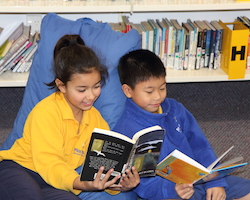图像

School Curriculum
Macleans Learners are provided with an integrated curriculum based on contexts that are authentic and meaningful for 21st century learners. Explicit teaching of reading, writing and mathematics in particular, occurs within these contexts.
- Literacy - reading, writing, speaking, listening, viewing and presenting information.
- Numeracy - number, statistics, geometry, measurement.
- Inquiry - undertaking an investigation usually based around a science, social studies or technology topic.
- Information Processing - e-learning using computers, library and research skills, thinking and problem solving strategies.
- Healthy Living - personal care, safety, nutrition, physical education and sport.
- The Arts - visual art, music, drama and dance.
Learner Support
Delivery of the Health Curriculum
- Please refer to this pamphlet.
Homework
- Requirements are outlined by classroom teachers at the beginning of the school year.
Sporting and Cultural Opportunities
- Macleans Learners are provided with opportunities to participate in syndicate and school-wide sporting events.
- Year 4, 5 and 6 Macleans Learners participate in school and interschool sports including: swimming, winter codes, gymnastics, cross country, and athletics.
- At various year levels; Jump Jam, NZ Writers Quiz, Choir, Instrumental groups, English and First Language Speech Competitions and Mathex, provided.
Library
- The school is fortunate in having an excellent library, which is a feature of the school. The library is open for children at lunch time for the borrowing of books and during their class library time.
Educational Trips
- The process of learning and understanding is greatly enhanced by direct experience. It is likely that your child will have the opportunity to participate in educational trips. Parent support is often needed with transport and supervision and written notification regarding class visits will be sent home by teachers concerned. Your assistance will be highly valued.
Reporting to Parents
- Learning Conferences, attended by the child, parents and teacher are held at least twice a year.
- Portfolios communicating each child's progress and achievement in aspects of the curriculum and against National Standards are sent home prior to Learning Conferences. At the end of the year these form each child's report.
- The progress and achievement of non-English speaking children is reported on, in relation to the English Language Learning Progressions and National Standards.
English for Speakers of Other Languages - E.S.O.L.
- Additional learning support is provided for children whose first language is not English.
- Specially trained teachers/teacher aides provide in-class and/or withdrawal group support for speaking, reading and writing in English.
- English Language Learning Progressions (E.L.L.P) are used by classroom teachers to plan and deliver learning programmes appropriate to the stage and mastery level of each child's spoken and written English.
Reading Recovery
- A specialist teacher provides 1 to 1 Reading Recovery tuition for the lowest achieving six year old children on a daily basis for 20 weeks.
Learning Assistants
- Learning Assistants work either in-class or in a withdrawal group situation to assist children who need additional support with aspects of their learning or self management.
Para-professional Support
Specialist staff are available upon application to work with staff and children to meet identified personal, social or learning needs.
- R.T.L.B Resource Teachers of Learning and Behaviour
- R.T.Lit Resource Teacher of Literacy
- Speech Therapists
- Special Education Psychologists and Caseworkers
- Physical Disabilities Service - Physiotherapists and Occupational Therapists
